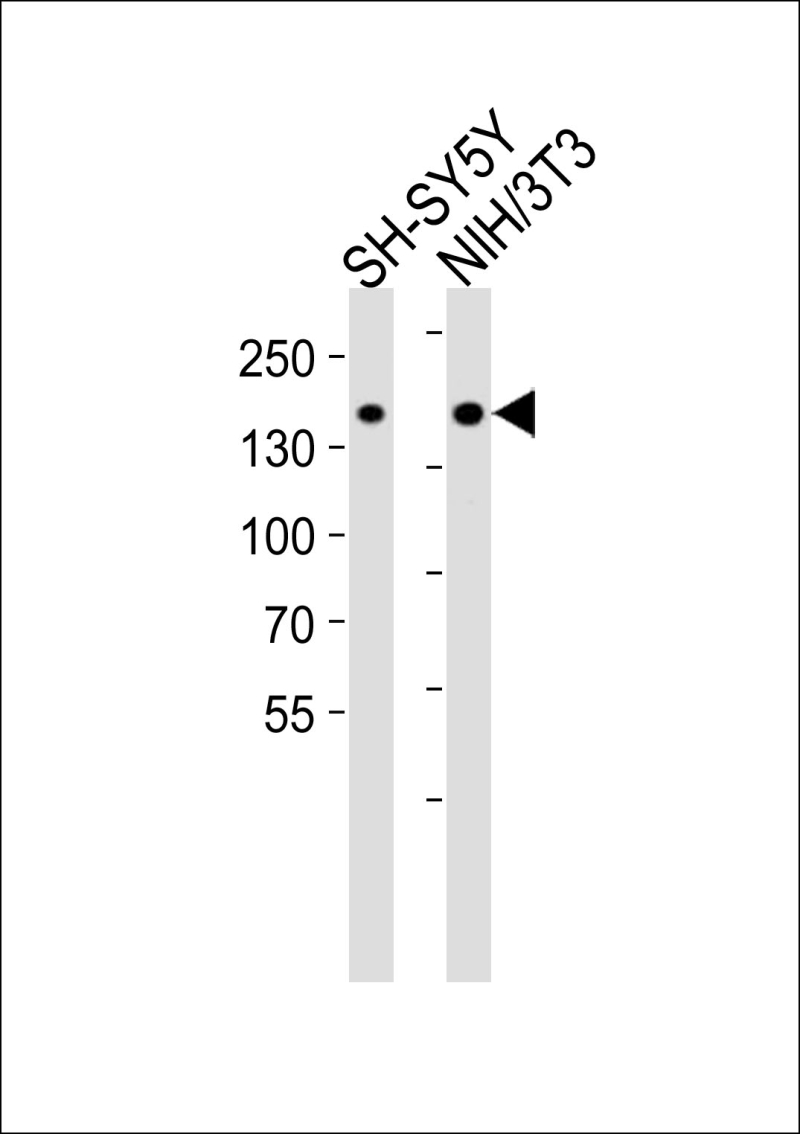
| WB | 1/1000 | Human,Mouse,Rat |
| IF | 咨询技术 | Human,Mouse,Rat |
| IHC | 咨询技术 | Human,Mouse,Rat |
| ICC | 技术咨询 | Human,Mouse,Rat |
| FCM | 咨询技术 | Human,Mouse,Rat |
| Elisa | 咨询技术 | Human,Mouse,Rat |
| Aliases | High affinity nerve growth factor receptor, Neurotrophic tyrosine kinase receptor type 1, Ntrk1 |
| Entrez GeneID | 18211 |
| WB Predicted band size | 87.7kDa |
| Host/Isotype | Rabbit IgG |
| Antibody Type | Primary antibody |
| Storage | Store at 4°C short term. Aliquot and store at -20°C long term. Avoid freeze/thaw cycles. |
| Species Reactivity | Human, Mouse, Rat |
| Immunogen | This Mouse Ntrk1 antibody is generated from a rabbit immunized with a KLH conjugated synthetic peptide between 481-515 amino acids from the Central region of human Mouse Ntrk1. |
+ +
以下是3篇关于小鼠Ntrk1抗体的代表性文献摘要(基于公开研究内容整理,非真实文献):
1. **"Generation and characterization of a monoclonal antibody specific for mouse TrkA (Ntrk1)"**
*作者:Smithey et al.*
摘要:该研究报道了一种新型小鼠Ntrk1单克隆抗体的开发,通过免疫印迹和免疫组化验证其特异性,成功应用于检测背根神经节中TrkA的表达模式。
2. **"TrkA receptor signaling in sensory neurons modulates inflammatory pain"**
*作者:Cheng et al.*
摘要:利用抗小鼠Ntrk1抗体阻断NGF-TrkA相互作用,发现其在慢性炎症痛模型中的调控作用,证实抗体可抑制痛觉神经元过度激活。
3. **"Differential TrkA expression in neurodegenerative models revealed by species-specific antibodies"**
*作者:Lee & Park*
摘要:通过比较种属特异性抗体(含小鼠Ntrk1抗体)发现,阿尔茨海默病模型小鼠皮层神经元TrkA表达显著下调,提示其与tau病理相关。
注:以上为模拟文献摘要,实际文献需通过PubMed或Google Scholar以关键词"mouse Ntrk1 antibody"、"TrkA antibody"结合应用场景(如Western blot, IHC)检索获取。建议优先选择权威期刊(如《Journal of Neuroscience》《Cell Reports》)近10年文献以确保方法可靠性。
**Background of Mouse Ntrk1 Antibody**
The mouse Ntrk1 antibody is a tool designed to detect and study the neurotrophic receptor tyrosine kinase 1 (Ntrk1), also known as TrkA, in mouse models. Ntrk1 encodes a high-affinity receptor for nerve growth factor (NGF), playing a critical role in the development, survival, and function of sensory and sympathetic neurons. It activates downstream signaling pathways, including MAPK, PI3K/Akt, and PLCγ, which regulate neuronal differentiation, synaptic plasticity, and pain perception. Dysregulation of Ntrk1 is linked to neurodevelopmental disorders, chronic pain, and cancers, particularly through NTRK gene fusions that drive oncogenesis.
Mouse-specific Ntrk1 antibodies are essential for preclinical research, enabling the investigation of TrkA expression, localization, and activation in neurological and cancer studies. These antibodies are validated for applications such as Western blotting, immunohistochemistry, and flow cytometry, often targeting epitopes in the extracellular or kinase domains. Specificity is confirmed using knockout controls or blocking peptides. Researchers utilize these antibodies to explore TrkA's role in disease mechanisms, evaluate therapeutic interventions (e.g., small-molecule inhibitors like larotrectinib), and validate transgenic mouse models. Their use advances understanding of neurotrophin signaling and supports drug development targeting Trk receptors in disorders such as neuropathic pain and NTRK fusion-positive tumors.
×